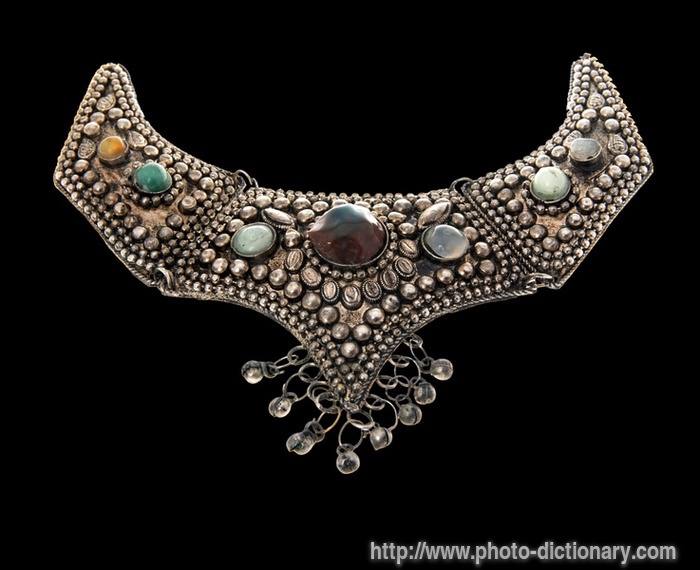Necklace
The necklace is a piece of jewelry that can be traced back throughout history as being worn by both men and women. They were often used as ways to make a distinction among many cultures.
Historians and archeologists have discovered that the necklace originated maybe forty thousand years before originally believed. In South Africa they have excavated a cave that had over 41 mollusks that were strung as possible neck jewelry nearly 75,000 years ago. At that time, people were decorating themselves with mollusk necklaces. Later, necklaces made of stones, bones, shells and animal teeth became popular. After the discovery of metals, gold, silver and a variety of other metals were used to make eye-catching necklaces for both men and women
Later, in 2500 B.C., necklaces were being made from gold. These gold choker and adornments were discovered in Ur. Later Sumerian’s began using beaded neck jewelry using examples of colored stones, copper and other metals.
The ancient Egyptians were more evolved. They grew from simple stringed bead necklaces to the more complicated patterns. They also had the broad collar and pectoral type necklaces that both men and women wore, especially the wealthy and royalty. Many of these necklaces were buried with them. These necklaces were often richly ornamented and were a big part of the dress attire.
There are numbers of necklace types that we can recognize:
Bib necklace; A bib necklace is made multiple strands of stepped pearls.
Choker; 35 centimetres (14 in) to 43 centimetres (17 in) long and sits high on the neck.
Princess necklace; A princess necklace is 45 centimetres (18 in) to 50 centimetres (20 in) long. It is between choker and matinee length.
Sharktooth; sharktooth necklace is a necklace with a shark tooth attached.
Sautoir or rope necklace; A sautoir or rope necklace is any necklace longer than opera length.
Uniform necklace; A uniform necklace consists of pearls that appear to be all the same size, although normally there is a slight difference towards the ends so they appear to be in proportion.
Gold was abundant during Alexander the Great period of ruling the Greek Empire. They used gold to make necklaces and many other types of jewelry for many centuries.
Now the Ancient Romans frowned on wearing jewelry. There were laws that dictated how much gold a woman could wear or be buried with. During the first century, the Roman style of jewelry started using gemstones cut in circular or rectangular shapes.
Later on, it became popular for women to wear many necklaces at once. This would indicate her level of wealth or her class. For a few years, the popularity of necklaces waned until the late 14th century when they regained popularity. Now necklaces are popular among all classes of people.
